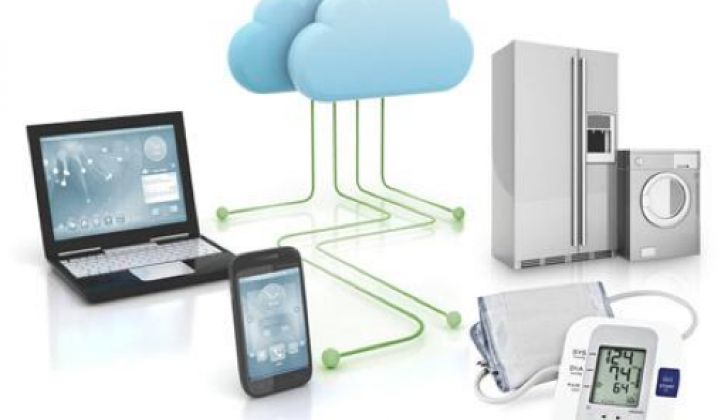The “internet of things” means different things to different people, from General Electric’s networked jet engines and power turbines and Cisco and IBM’s smart streetlights and parking systems, to smartphone-enabled home security, entertainment and medical devices.
All of this will need an IT infrastructure to build on, from the chips that make devices “smart,” to the cloud computing platforms that make them all work together. That’s the goal that startup Ayla Networks has set for itself, and on Wednesday it landed a $14.5 million Series B round to test it out with an expanding list of partners.
Existing investors Voyager Capital and Crosslink Capital were joined by some high-profile new investors in Wednesday’s round. Those include strategic investor Cisco, Chinese venture fund SAIF Ventures, and the World Bank’s International Finance Corp. The Sunnyvale, Calif.-based startup also announced it was actively designing products with makers of “residential fire and safety monitoring, thermostats and broader HVAC control, water treatment and management, door locks, and home control.”
Ayla, founded in 2010, came out of stealth last summer with a $5.4 million Series A round, and a pretty impressive list of partners. On the chip side, Broadcom and STMicroelectronics had agreed to embed Ayla’s software on their latest generation of low-power Wi-Fi chipsets. Wednesday’s announcement added Murata Americas, NXP, and United Scientific Industrial Co. to its list of chipmaker partners.
That’s an important distinguishing feature for a startup, and CEO and co-founder Dave Friedman says it’s at the heart of the platform’s scalability. “A reference design does not scale,” he said. “If I give you software and say, 'Put it in your thing,' everyone’s going to do it a little bit differently.” With embedded software, “I can support it in a thousand different designs,” he said. “It never changes.”
That also helps Ayla to manage the ebb and flow of connectivity and data in an ever-shifting sea of hot spots, sleeping cells and the like. “If you were to characterize the system, the thing you’re trying to connect in that space, it’s very fragmented -- but one thing we know is that if it’s going to join the internet of things, it’s going to need communications,” he said.
From there, “We have a platform that connects and binds these things very easily to the cloud, where these virtual platforms exist,” he said. “Our customers don’t have to write software to the cloud. We’ve removed the friction there.”
Ayla likes to refer to its process as “Agile IT -- being able to make changes, make new rules, make things talk to other things, talk to the cloud,” he said. “Building in that level of flexibility and extensibility, that takes nothing but experience on how to do this over and over again.”
Ayla’s biggest partner to date is Sina, owner of Weibo, China’s answer to Twitter, which has adopted the startup’s cloud platform for consumer devices. The partners are looking at lighting control, door and window monitors, and indoor air-quality management applications. But Ayla is definitely targeting North America, and is working with unnamed partners that Friedman said included some heavyweights in the field.
How does Ayla’s approach blend in with all the other technology going into the internet of things? We’ve seen a number of home automation startups, such as Digi International, GreenWave Reality, iControl, Alarm.com, MiOS, Control4 (now public) and Nest (now Google), working with telecommunications and home security firms, home improvement and retail electronics stores, and of course, countless utility pilot projects.
All in all, these companies do what they do well, Friedman said. “They’re very focused on the set-top box, the intelligent gateway, when to prioritize different packets, and how to connect them to the cloud. That’s an area of expertise we don’t have -- in some ways, we’re solving different problems and can work together.”
As for Cisco, Friedman declined to say much, beyond the fact that the networking giant was coming on board as a strategic investor. Cisco has internet-of-things projects across the world, and is often collaborating quietly with any number of technology providers to make them work more smoothly. Other major players like Honeywell, GE and Panasonic are designing their own networked device cloud platforms.



